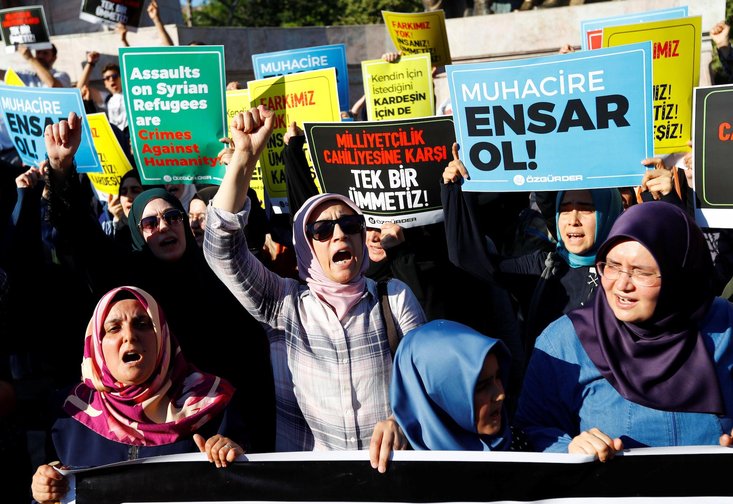“My movement is limited, I cannot walk anywhere,” Jasim said, explaining that police often check for identity documents in his area. “It’s affecting everyday life. It’s a constant stress for us. Not just for us – for activists – but for all refugees.”
Jasim said that he has come to fear racist violence from members of the public as well as the state. “I don’t feel safe speaking Arabic in public anywhere. If I’m on the bus, I don’t pick up the phone if it’s someone who speaks Arabic.”
Tariq*, 32, from Tunisia, is all too familiar with this fear. He said that, last year, his friend was stabbed mid-conversation after a group of men heard them speaking Arabic in public. “They started yelling and they surrounded us,” he said. “Then a guy pulled out a knife and stabbed [my friend] in the stomach.”
Tariq was in Edirne, a city on the border to Greece, working for Josoor at the time. Edirne frequently sees high numbers of refugees passing through – either on their way to the Greece or Bulgaria borders, or after having been illegally pushed back from those countries. He said his friend survived the attack, but has since left Turkey for Europe.
Tariq, meanwhile, returned to Tunisia in July after his residence permit was rejected three times without a reason given. On leaving Turkey, he was banned from re-entering the country for one year. Tariq believes that his work with Josoor is likely to be the reason for the ban.
Closing space for solidarity
According to Danış, the professor and migration researcher, there is currently no political party or major civil society group advocating for refugee rights in Turkey. Some organisations do, but they tend to be grassroots groups with limited funding. And, she said, the space in which they operate is becoming increasingly narrow. “Staff are feeling pressurised,” Danış said. “They try to be invisible, low profile in the public sphere.”
Danış explained that “technical controls”, such as inspections of paperwork, are used by the government to pressure Syrian and Turkish NGOs not close to the ruling party. Some organisations have received hefty fines for simple errors, heavily restricting their operations or even forcing them to close. Danış added that an overall lack of funds is also squeezing grassroots groups, since pro-government NGOs tend to be awarded the lion’s share of international and national funding.
“The rising anti-refugee climate is very sad, because Turkey actually did quite well,” Danış said. “Turkish society actually received almost four million Syrians. In certain cities like Gaziantep, Hatay, it’s maybe 25% of the current urban population. A European person can never imagine what this means.”
Violence at the border
While the situation within Turkey has become increasingly dangerous for migrants, Gruber said that she fears even more for those in the border areas. Josoor was regularly monitoring rights violations at the EU-Turkey border before their closure, and collected testimonies from pushback survivors for the Border Violence Monitoring Network.
“It’s definitely going [in that direction], that people will just openly be killed,” she said, referring to a case in August where a five-year-old girl died when 38 people were left stranded for a month on a disputed islet between Greece and Turkey.
“Things are getting too dangerous here. It’s no longer possible for any actor that does not have an international mandate to do anything,” she said. “Both sides are preventing us from doing the work that we were doing, and all sides just want to prevent support for people on the move.”
Tariq, the team member from Tunisia, said he agrees with Josoor’s decision to close, but is worried about what will happen to people arriving in Turkey after being illegally pushed back from Greece. Since Josoor’s closure, no one else has stepped up to offer support.
“They need help,” said Tariq. “I know what they’ve been through. Some of them got pushed back naked, they’ve been beaten – imagine someone, he’s beaten, he doesn’t have money or a place to crash, and it’s getting cold, and there are children.”
He speaks from experience. Tariq said that, before he decided to stay and support others in Turkey in 2020, he was pushed back from Greece to Turkey four times in two months. Tariq said he was violently beaten by Greek police during those pushbacks, and on one occasion, was left stranded on an islet in the middle of the Evros river, which marks the border between Greece and Turkey.
Both sides profess their innocence, and are usually quick to blame the other for human rights violations when reports emerge. Greece has long denied carrying out pushbacks, which are illegal under international and EU law. However, a leaked report from the EU anti-fraud watchdog has detailed serious allegations of human rights violations and pushbacks carried out by Greece and then covered up by Frontex, the EU border agency. Turkey, meanwhile, has reportedly subjected hundreds of refugees to arbitrary arrest, detention and deportation this year.
For the few remaining organisations which monitor those rights violations on this highly politicised border, there is simply no longer enough space to operate in.
“We cannot do this safely anymore,” Gruber said. “There is no security anymore for people who speak out against human rights violations at the hand of European authorities […] [And] the situation in Turkey itself, it’s very frightening.”
* Refugees’ names have been changed to protect identities.


Comments
We encourage anyone to comment, please consult the oD commenting guidelines if you have any questions.